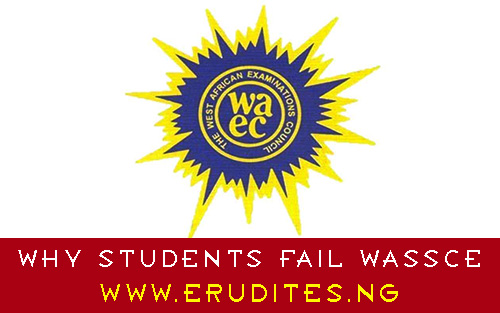Is it not appalling and nauseating that candidate’s performance in Christian Religion Studies in West African Examination Council is below expectation? Actually, it ought not to because, the questions aren’t a factor of how often you attend church, though this will help. In line with WAEC highlight, reasons why candidates fail CRS WAEC 2019 will be the central theme of this post.
Candidate’s Weakness
The following were some of the candidates’ weaknesses:
- Insufficient knowledge of the bible and prescribed texts
Some candidates answered questions that they did not have proper knowledge about therefore; they guessed the answers to such questions. This made candidates to be unable to score high marks in such questions. Also, some candidates failed to understand the demands of questions and such candidates strayed away from the essence of the questions.
- Inadequate and inappropriate responses to questions
Many candidates responded inadequately to the demands of the questions by giving inadequate answers to questions especially in questions demanding that candidates answer from a particular biblical point of narrative. To this end, candidates failed to understand the demands of the questions and such candidates strayed away from the points required to answer such questions.
- Mixing up of Biblical characters/inadequate knowledge of Biblical Themes
It was observed that candidates were not familiar with the bible stories from which some questions were drawn. More often than not, candidates mixed up questions which were based on narratives with similar biblical stories. Such candidates took the question because of the part B which was based on application questions. To this end, some candidates answered questions that they do not have enough knowledge or understanding about. Perhaps, they did not understand the questions; however, the questions were straight forward. This led to some candidates writing outside the scheme of the set questions.
- Poor grammatical expression
The tenses and grammar of some of the candidates were not correct. They could hardly express themselves in the right tenses even in situation where they seemed to know the demands of the question. This in effect allowed the examiner to mark such candidates down.
- Unnecessary Preambles and introduction
Some candidates gave very long and unnecessary preambles to the questions instead of going straight to the answers. This made them waste valuable time on irrelevant points thereby, limiting their chances of scoring good marks.
- Illegible Handwriting
Some candidates wrote in illegible ways and bad handwriting which hindered examiners to decipher the words and meaning of what some candidates wrote. Wrong spellings coupled with poor expression of ideas negatively affected the performance of a lot of candidates.
Suggested Remedies to Overcome Candidates’ Weaknesses
The following are some of the actions necessary in tackling the identified weaknesses:
- Candidates should improve on their knowledge of the bible. They should prepare adequately for the examination by making efforts to comprehend the bible using the prescribed texts as a guideline. They should also make use of past WASSCE questions in preparing for the examination.
- Candidates should make effort on improving their understanding and mastery of the use of the English Language. This will enable them to comprehend the requirements and demand of questions, as it will also facilitate logical expression and coherent presentation of points. They can approach this by devoting quality time to reading books, novels, journals, etc.
- Candidates should get themselves familiar with contextual passages and strive to have adequate knowledge of biblical characters. No question is set outside the syllabus. To this end, they should consult the syllabus and the Revised Standard Bible as references when they study.
- Candidates are advised to go straight to the demands of the question rather than engaging in unnecessary preambles and semonization. There is no need giving introduction when answering questions or trying to explain what the question is. Introduction attracts no extra mark.
- They should show greater commitment and interest in the subject. They should work hard to cover the syllabus and revise with past question papers. Also, recommended textbooks specified by the syllabus should be used as it aids candidates on how to approach questions.
- They should complement their study of the bible (RSV) with their teacher’s notes as a companion. It is observed that candidates narrate bible stories using the residual knowledge they know or have gathered from Sunday school. This hinders candidates to give the main points as detailed and structured in the Revised Standard Bible.
- The need to re-orientate the interest of candidates on Christian Religious Studies is important. Most candidates feel they don’t need the subject, and in most cases, they only register it to complete their minimum subject requirements, thus, they show non-challant attitude towards it.
- Candidates should make effort on improving their understanding and mastery of the use of the English Language. This will enable them to comprehend the requirements of questions, as it will also facilitate logical expression and coherent presentation of points. Furthermore, candidates should understand and know how to interpret the demands of questions from the action verbs associated with the questions such as list, interpret, evaluate, identify, state, discuss, emphasize, outline, point out, demonstrate, deduce, analyze, elaborate, etc.
Candidate’s Strength
Some candidates carefully read the questions and understood the demand of the question before answering them. To this end, a substantial percentage of the candidates demonstrated good knowledge of the bible passages and topics from which questions were set. They gave detailed answers to the questions and presented their points in logical sequence by going straight to the points rather than unnecessary permeable, introduction and preaching. They showed good mastery of the passages and adhered to the rubrics.



